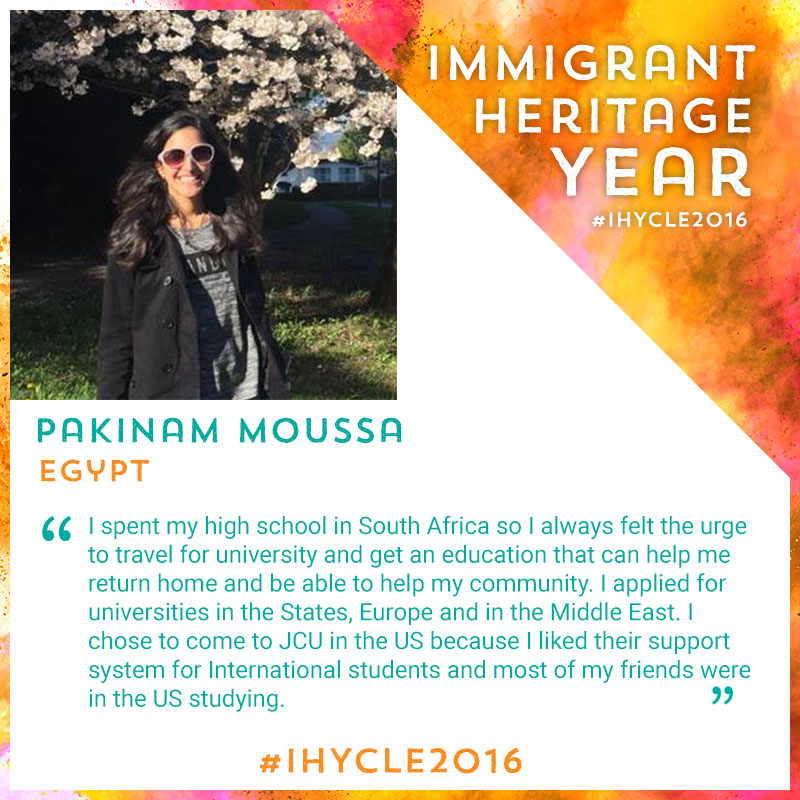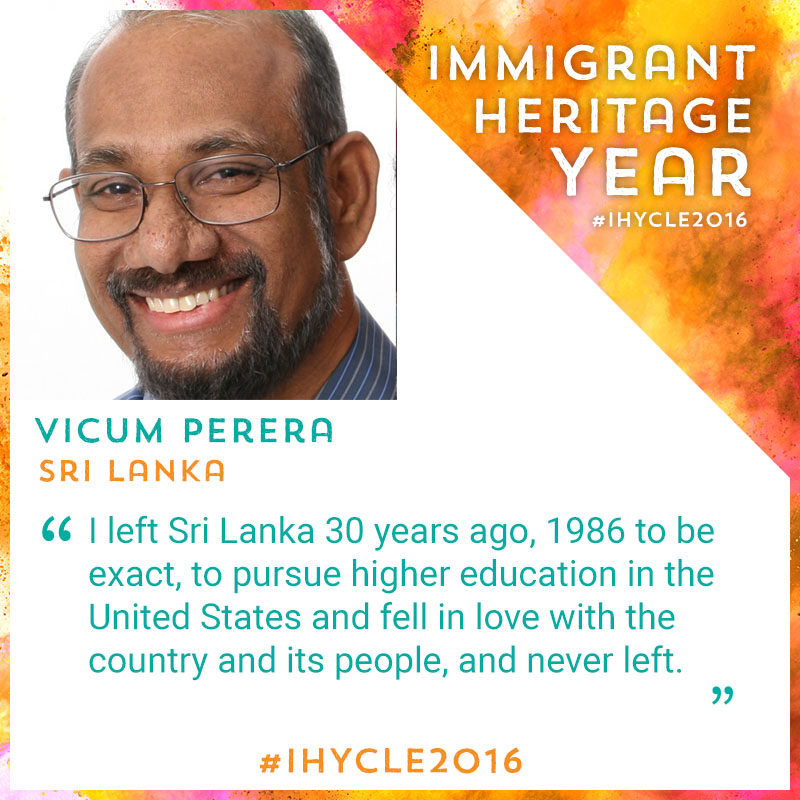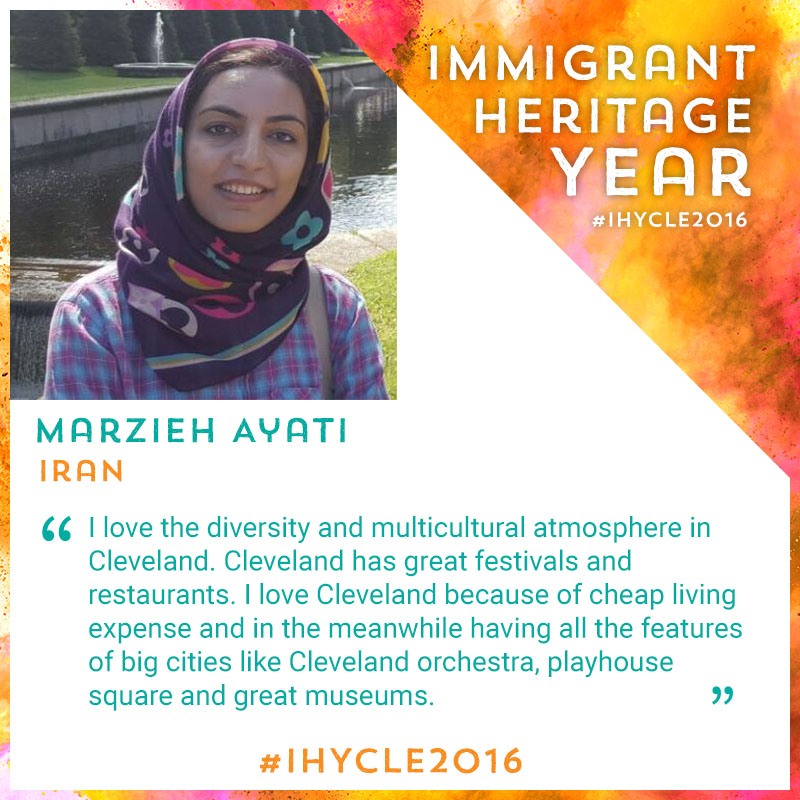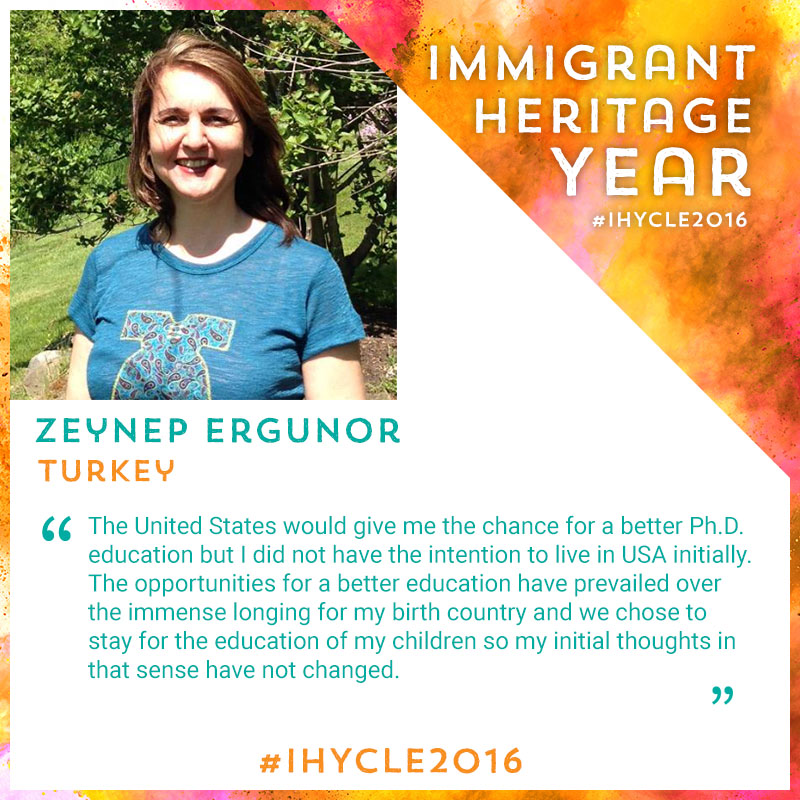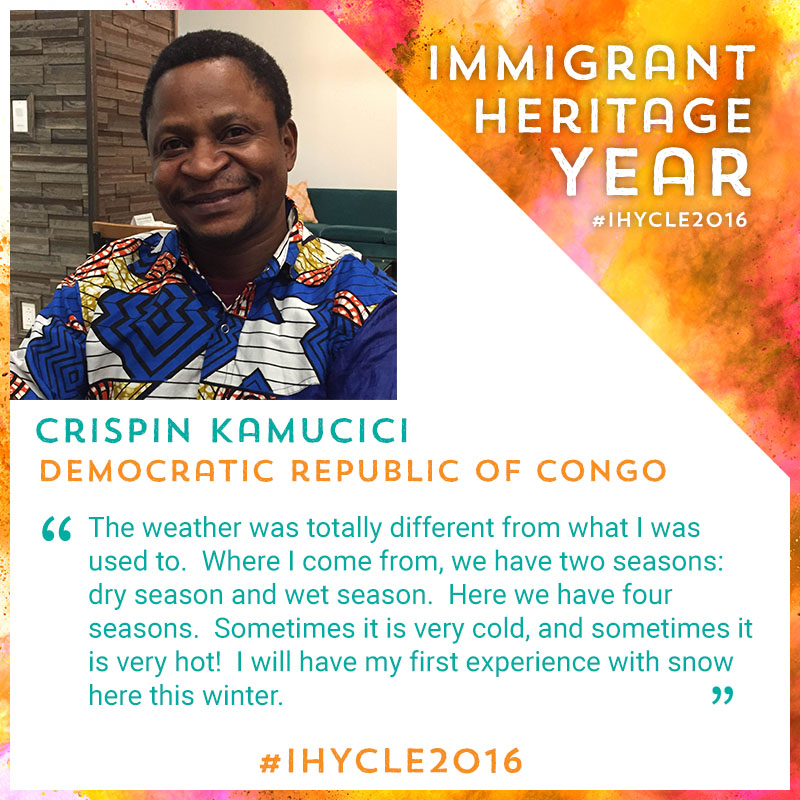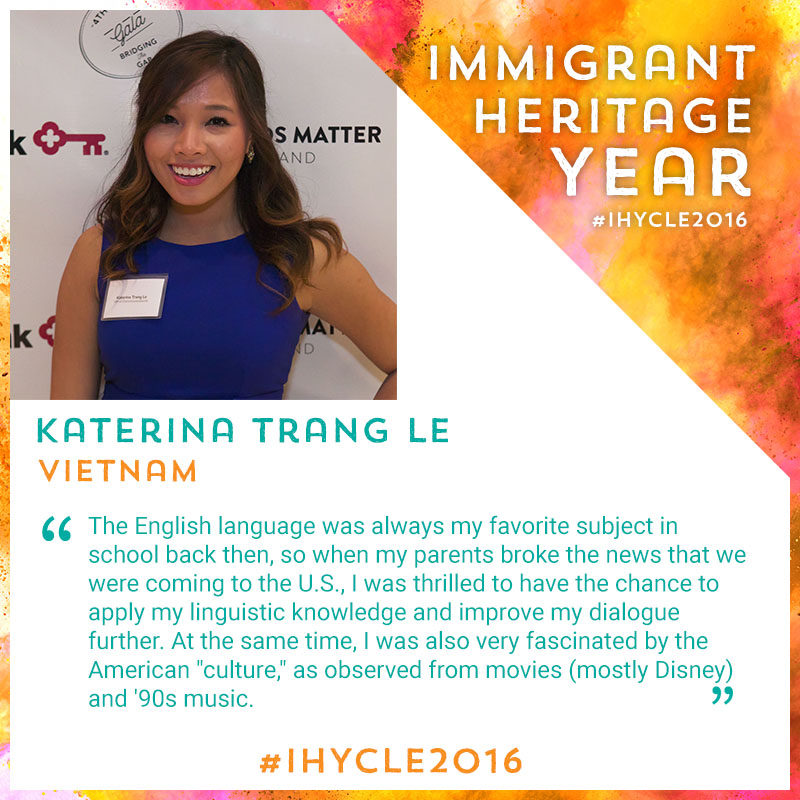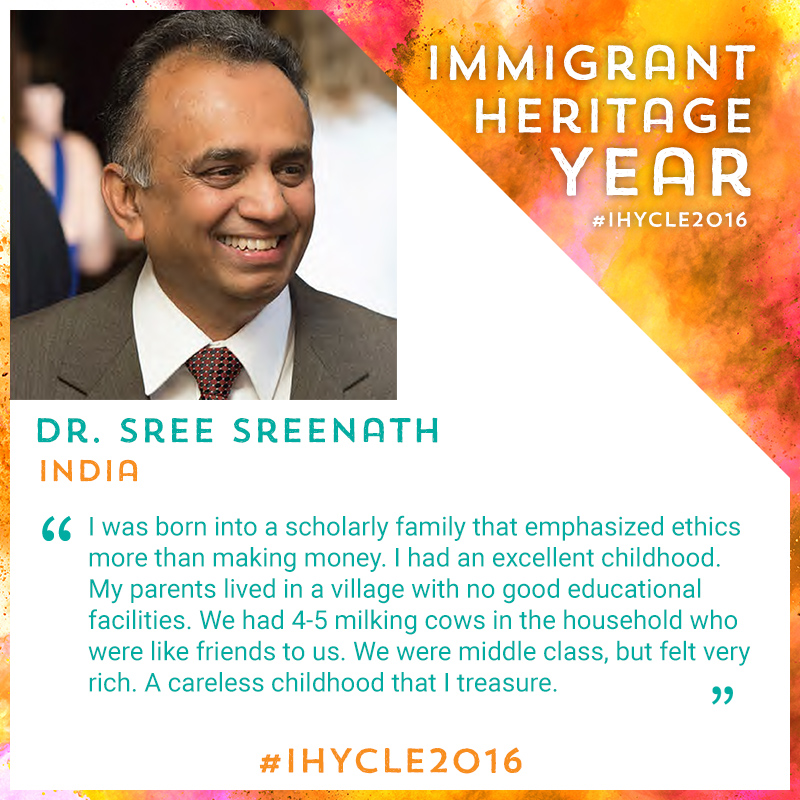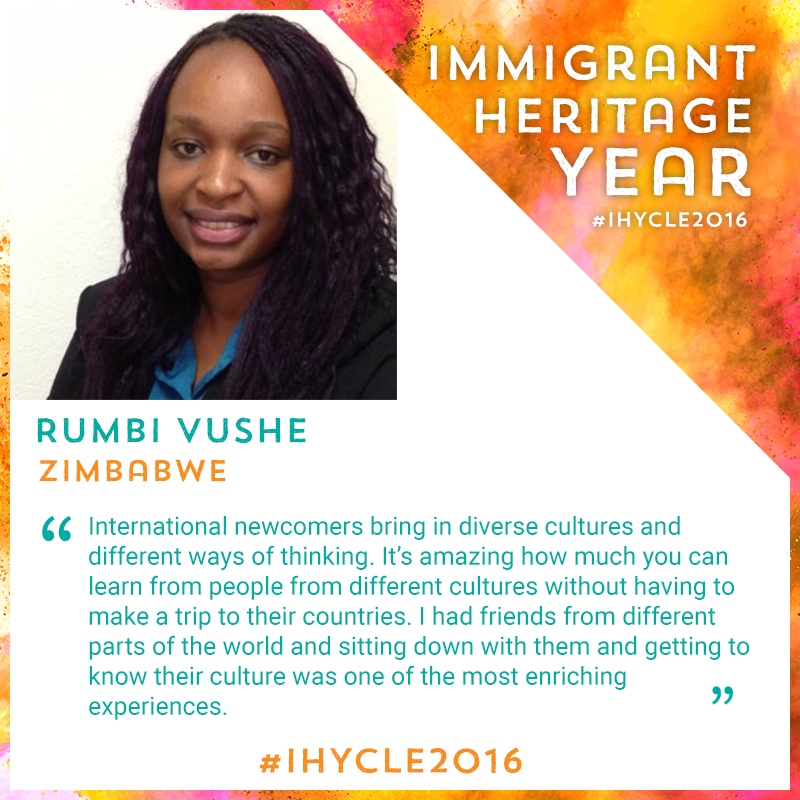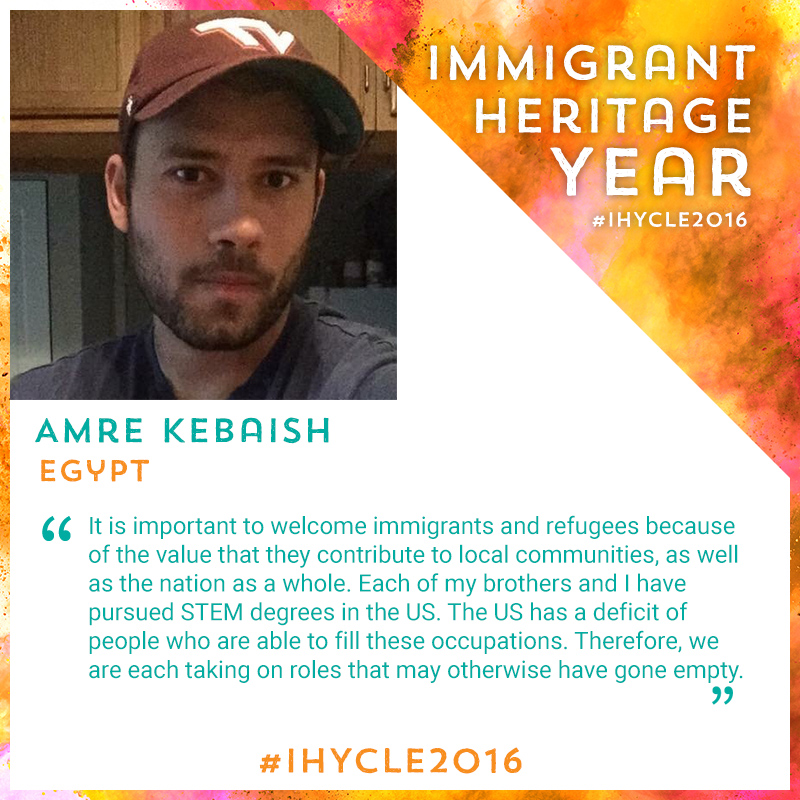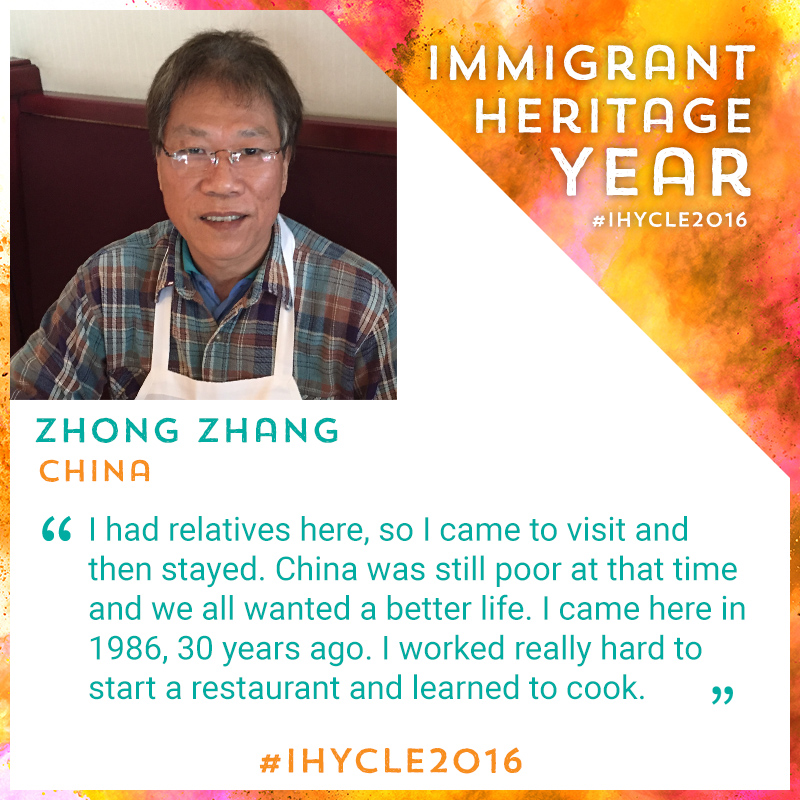Pakinam Moussa
Name:
Pakinam Moussa
Occupation:
John Carroll University student
Where are you from?
Egypt
What was it like growing up?
I grew up on a farm in Egypt and lived with my family. I am the oldest of three sisters. My parents valued education so much so I had to commute to school for an hour every day because of the good reputation my school had. Family in Egypt means extended family as well and there was a huge emphasis on spending summer time with them and celebrating successes with them.
Why did you decide to leave your home country and study in the United States of America?
I spent my high school in South Africa so I always felt the urge to travel for university and get an education that can help me return home and be able to help my community. I applied for universities in the States, Europe and in the Middle East. I chose to come to JCU in the US because I liked their support system for International students and most of my friends were in the US studying.
What were your first thoughts about coming to the United States of America?
When I first arrived in the US, I arrived in Atlanta then NYC then settled in Cleveland for University. I was shocked by how different each city is, shocked in a good way! I loved Cleveland because of the similarity in the Midwestern culture shared with back home.
Why should we welcome immigrants and refugees?
I believe that welcoming immigrants and refugees adds more to our diversity and sense of learning about the world around us. Welcoming them is also a humane thing to do since it is hard to say NO to those who have no place to go to. If their homes were okay, they would have never left.
Why is it important to travel abroad?
It is very important to travel abroad because you simply see another culture from its people’s perspective. Additionally, you get to make friends from diverse backgrounds and go on adventures that only add to your skills, memories and intellect. I had the chance to spent my high school years abroad in south Africa, my current college years in the US and I also travelled on semester at sea and to other youth forums in different countries. This time spent abroad made me more independent and more open to any challenges. Most importantly, it made me eager to learn about our differences than be afraid of them. and love to know more people who
Vicum Perera
Where are you from?
My native country is Sri Lanka, the country that elected the world’s first female head of state back in the 1960s. I left Sri Lanka 30 years ago, 1986 to be exact, to pursue higher education in the United States and fell in love with the country and its people, and never left.
What was your childhood like?
My family back ground in Sri Lanka was middle class and my father was a government servant. We did not have much in wealth and power but the childhood in Sri Lanka was magical. The country is blessed with the natural resources and the people are simple, unassuming, and helpful. In fact, Sri Lanka was recently listed along with the United States as one of the top five most generous countries.
What brought you to Cleveland?
My education brought me to the United States and to the State of Indiana. Once I finished my doctoral degree moved to Ohio and my employed at the Kent State University brought me to this part of the world.
What were your first thoughts about coming to the United States? Did those change?
In Sri Lanka, the United States is highly regarded as a world leader and is ranked at the top in favorable consideration. In fact, coming to the United States or to a European country in itself is considered as an achievement. This premises itself had created some animosity towards the United States among some political and social leaders to generate a half-hearted resentfulness. So, there is a bit of love-hate relationship towards the United States in theory. Coming to the United States and living among the Americans changed many of my views and I came to appreciate the many great cultural norms the American have. The Americans are the most generous people in the world and their ability to come together in many situations to achieve common goals to further the humanity is unbelievable. The freedom to move up to ones’ natural potential in itself is not possible anywhere else in the world!
What challenges did you face as transitioning here?
Transitioning into the cultural and behavioral norms of the United States was the biggest challenge that I faced. This includes the difference in the English accent and the associated difficulty in communicating well. In Sri Lanka, communication is not regarded as an asset and one has to bow to the authority of the elders and not speak up one’s mind. You are expected to tolerate incorrect notions and opinions of the elders and not contradict those regardless how absurd the notions are. So, the learning curve in expressing one’s ideas was a big challenge and doing so effectively is a remarkable hurdle to overcome.
What is your occupation?
I have a PHD in Mathematics and work as a Mathematician at the Kent State University. I work at the Trumbull campus of Kent State University as an Associate Professor for over 18 years.
How have other Clevelanders made you feel welcomed?
I have always felt welcomed and there are many great folks who go out of their way to be helpful. The activities and other cultural events organized in the area are quite remarkable. City of Cleveland is doing a great job in this regard. I have attended the South Indian musical event, Thyagaraja Festival at Cleveland State University and have myself participated in hosting several Sri Lanka cultural events in the area.
What traditions or customs do you continue to practice?
My native country consists of a majority of practicing Buddhist who adheres to the nonviolent behavior towards humans and all living beings. The diversity is accepted and valued. Diverse opinions and religious doctrines are accepted and not ridiculed or challenged. These practices, obviously, have a natural home in the United States. The Buddhist practices of Sri Lanka are continued by the northeast Ohio Sri Lankan community and our family also take part in these activities even though I myself grew up in Sri Lanka as a catholic in a mixed religious family.
What do you love about Cleveland?
Except for the bitter cold during the winter season, the city and its people are warm and welcoming. I love the activities and resources available to the diverse cravings and appetite of the citizens. Educational and medical facilities available in the area are truly world-class and Cleveland is truly a world leader in this regard.
Why is it so important to welcome immigrants and refugees?
It is important to treat diversity as strength and not as a weakness. Everyone has something to contribute to the melting pot. Recognizing one’s strengths and abilities and using those skills to the common good of everyone is a challenge but a mark of a great leader. There is a story in Sri Lankan about seven folks who try to make a soup. Each one withheld his contribution to the soup hoping the others will contribute their ingredients and not contributing himself would not be a problem. Well, at the end all seven did not contribute and the soup was just a pot of boiling water! To make the melting pot truly so, each one should be allowed to contribute and benefit.
Why is it important to travel abroad?
The world is a diverse place with a diverse norms, values, cultural practices, foods and beliefs. All these have made the World a remarkable place. Bio-diversity, plants and animals and the natural beauty varies. Many countries and places that I have visited in the world are simply beautiful. I have yet to visit a place that is NOT so. Traveling is obviously one of the ways to witness this diversity.
Marzieh Ayati
Where are you from?
Iran
What was your childhood like?
I had a fun and great childhood in Iran. I have an educated family who supports me to continue my study.
What brought you to Cleveland?
Graduate school brought me to Cleveland. I am a research assistant and a phd student of computer science at Case Western Reserve University.
What were your first thoughts about coming to the United States? Did those change?
Lots of things were in contrast with my expectations: I am from Tehran which is capital of Iran. It is mostly like NYC, lots of tall building and nightlife. So I thought all US cities are like that. I came to Cleveland in the winter and I rarely saw people in the street. Old apartments around school, no ring bells, traffic lights hang on the wires not bars. I thought it was a dead city. Later, I figured out some buildings are connected to each other from inside. Moreover, I thought there would not be any gender inequality in US. But what I am seeing and hearing now is different. Right now, there are just a few girls in the computer science program. However, in Iran half of my classes were girls.
What challenges did you face as transitioning here?
New language and new culture are the biggest challenges. Even in the school. The first days at school were so shocking and funny for me. Students were eating in the class, putting their foot on the desk in front of professor or even call the professor by their first name. In Iran, we have more discipline at school. We even stand up when the instructor enters the class. Another challenging thing was that I could not find a topic to connect to American people. Back home, we usually talk about religion and politics. Here, I have been told not to talk about them at all. So here people usually talk about their pets, calories/diets and sports and I had no idea about them.
What is your occupation?
I am a research assistant and phd student of Computer science at Case Western Reserve University.
How have other Clevelanders made you feel welcomed?
Clevelanders are the most welcomed people I have seen in these years. I have never felt discriminated in any communities here, although I am wearing scarf and have an accent. I felt so welcomed in this diverse community.
What traditions or customs do you continue to practice?
I am Muslim. So I am trying to practice my religion and I am wearing scarf as well. I also celebrate traditional Iranian holidays like new year (it is the beginning of Spring which is March 21st), Yalda night which is longest night of the year.
What do you love about Cleveland?
I love the diversity and multicultural atmosphere in Cleveland. Cleveland has great festivals and restaurants. I love Cleveland because of cheap living expense and in the meanwhile having all the features of big cities like Cleveland orchestra, playhouse square and great museums.
Why is it so important to welcome immigrants and refugees?
Diversity helps to improve the community. People from different background and different culture add values to the society. Regarding refugees, we should keep it in our mind that nobody likes to run away from home if home is a safer place. We should put ourselves in their shoes. Give and it will be given to you.
Why is it important to travel abroad?
It is a great experience that opens our mind. Traveling to different countries helps us not to stereotype and judge people based on their ethnicity, religion and culture.
Zeynep Ergungor
Where are you from?
I am from Istanbul, Turkey
What was your childhood like?
I grew up steps away from the sea, living with my family of 5, with 2 siblings. I was a tomboy, playing on the streets the whole day with a bunch of friends.
What brought you to Cleveland?
My husband and I came to Cleveland in 2000, when he found his job after we were done with our Ph.D.’s in Michigan. I worked at a local university for a while and then started working in the private sector.
What were your first thoughts about coming to the United States? Did those change?
The United States would give me the chance for a better Ph.D. education but I did not have the intention to live in USA initially. The opportunities for a better education have prevailed over the immense longing for my birth country and we chose to stay for the education of my children so my initial thoughts in that sense have not changed.
What challenges did you face as transitioning here?
The day-to-day use of the English language was one of the challenges, it took me quite a while to understand the phrase ‘For here or to go’ at fast-food restaurants for example. Missing my family and friends was –and is- the biggest hurdle for me. The culture is quite different, it might be difficult sometimes to find ways not to offend or not get offended.
What is your occupation?
I am a chemical engineer and work as a product engineer at a company in Kent.
How have other Clevelanders made you feel welcomed?
Clevelanders are always quick to greet when they run into you.
What traditions or customs do you continue to practice?
We celebrate certain holidays observed in Turkey by getting together with friends. The most important one is the Turkish Republic Children’s day on April 23rd which we have been celebrating with other international communities in the last two years where group of children perform traditional songs or dances. We intend to increase the number of participant countries in the coming years.
What do you love about Cleveland?
Not the weather! I love the lake, although I wish I found more ways to enjoy it. Cuyahoga National Park, Playhouse Square, Cleveland Orchestra and Cleveland Museum of Art are great assets. Downtown Cleveland changed tremendously in the last 16 years and we enjoy the restaurant scene more and more.
Why is it so important to welcome immigrants and refugees?
Every person we meet is a new experience in our life, immigrants and refugees are the best example for an even more enriched experience. A majority of them is here to have a better life and they work hard to make that happen for themselves and more so for their children, a society would only benefit from ambitious people.
Why is it important to travel abroad?
Per the famous proverb: He who travels has stories to tell…
Crispin Kamucici
Where are you from?
I am from the Democratic Republic of Congo.
What was it like growing up?
I grew up in a Christian family; I have two brothers, and five sisters. I lived in several places during my youth. I was living between Burundi and Congo.
What brought you to Cleveland?
I came to Cleveland with my family as a refugee through UNHCR’s resettlement program.
What were your first thoughts about coming to the US? Did those change?
First, when I knew I was coming to the US, I thought it would be very hard for me and my family of 12 to adjust culturally, but also I thought the US was a land of much opportunity. I thought we could make it here. The adjustment was not as difficult as I thought because of the people we met here. The US is indeed a country of much opportunity, and I still believe that we will make it.
What challenges did you face as an immigrant transitioning here?
The biggest challenge has been cultural. There is a kind of freedom in this country that makes people a bit crazy. As a Christian and as a minister, I realized that people are not really interested or open to the change that the Word of God can bring into their lives.
The weather was the second biggest challenge. The weather was totally different from what I was used to. Where I come from, we have two seasons: dry season and wet season. Here we have four seasons. Sometimes it is very cold, and sometimes it is very hot! I will have my first experience with snow here this winter.
What is your occupation?
I am fortunate to work for Margaret Wong & Associates, which is the best immigration law firm in the area. I am also passionate about preaching the Gospel of the Kingdom of God.
How have other Clevelanders made you feel welcome?
We were warmly welcomed through Catholic Charities. We connected quickly with other refugees and people from the Congolese community through our interpreter. We joined a church, and the pastor was very helpful for us. Now we are connecting slowly to other members of the community who are not refugees, immigrants, or Africans. We are beginning to connect to Americans.
What traditions do you continue to practice?
I was raised in a Pentecostal family, so I raise my family that way. The traditions that we practice are based on the Word of God. We love each other and we believe this is the best tradition to practice, based on the Word of God.
What do you love about Cleveland?
Cleveland is a multicultural city. It has a good educational and health system compared to where I’m coming from and there are a lot of recreational areas.
Why is it so important to welcome immigrants and refugees?
First of all, they bring in cultural diversity. They also contribute to the economy of the city because they are an additional workforce. Most of them have experienced a lot of hardships in their life, making their experiences helpful if people will listen to them. I have noticed that people here don’t value the opportunities they have here. If they listen to refugees and immigrants, they can change their thinking, and maybe even their behavior.
Why is it important to travel abroad?
You learn new things. Also, you share your own experiences. You gain, and the others gain too.
Katerina Trang Le
Where are you from?
Ho Chi Minh City, Vietnam.
What was your childhood like?
I grew up in a middle class family in the second most populated city in my country. Education was not optional, it was considerably the most important aspect of my childhood. Even though my parents never finished high school, they did everything in their power to ensure my younger brother and I receive the highest academic quality to succeed in life. Disappointing your parents was quite frankly not a choice, so growing up, focusing on school was the only thing that I knew of.
What brought you to Cleveland?
My immediate family and I emigrated from Vietnam to the U.S. in 2008. We lived in Minnesota for two short months with the majority of my dad's side of the family. It was during the recession of 2008, the job market wasn't looking so great for my non-English-speaking parents. We had a few relatives who happened to have lots of connections in Cleveland, so we left Minneapolis with a leap of faith. Eight years later, I'm genuinely glad that we made that move.
What were your first thoughts about coming to the U.S.? Did those change?
The English language was always my favorite subject in school back then, so when my parents broke the news that we were coming to the U.S., I was thrilled to have the chance to apply my linguistic knowledge and improve my dialogue further. At the same time, I was also very fascinated by the American "culture," as observed from movies (mostly Disney) and '90s music. It was more of an excitement realizing that my life was about to turn onto a whole new chapter. Having lived in this country in the past 8 years, I can honestly say that those feelings haven't worn of and I'm proud to call this city and this country my second home.
What challenges did you face as transitioning here?
The diversity! It was one of those good challenges that I was glad to stumble upon. Cultural diversity was certainly not a thing back home. I found it rather fascinating to learn about cultural differences and embrace them. And Cleveland has been amazing at showing me the rope of diversity!
What is your occupation?
I am a Senior Talent Sourcing Specialist at Alexander Mann Solutions, a UK-based Recruitment Process Outsourcing firm with a global client service center located right in the heart of downtown Cleveland.
How have other Clevelanders made you feel welcomed?
With their undying loyalty, sportsmanship, genuine, and down-to-earth hospitality!
What traditions or customs do you continue to practice?
Eating delicious homemade Vietnamese food (a bowl of pho for chilly winter days is my comfort food), celebrating Lunar New Year
What do you love about Cleveland?
Cleveland State University and downtown! As a proud alumna, I credit all the opportunities presented to me, the friendships I've made, the people I've met, and most importantly my Cleveland pride and love to CSU. It wasn't until college that I truly got to see what Cleveland had to offer. I love spending time in downtown, for work, the gym, hanging out with friends, participating in a public event, and as of late, checking out the newly renovated Public Square under holiday lights!
Why is it so important to welcome immigrants and refugees?
Natives, immigrants, refugees, whatever your classification might be, I believe that at the core, we are all human beings. Why limiting one's self to only knowing your own bubble when you can learn about how big our world actually is at the comfort of living in such a diverse city?
Why is it important to travel abroad?
Because "Travel makes one modest. You see what a tiny place you occupy in the world."
Dr. Sree Sreenath
Where are you from?
I was born and brought up in Bengaluru, India which is one of the largest High-Tech cities in the world.
What was your childhood like?
I was born into a scholarly family that emphasized ethics more than making money. I was brought up as one of the two lone males among 10 women (mother’s sisters and grandma) in my maternal grandfather’s house. Excellent childhood. Parents lived in a village with no good educational facilities. We had 4-5 milking cows in the household who were like friends to us. We were middle class, but felt very rich. A careless childhood that I treasure.
What brought you to Cleveland?
Academic job after my Ph.D. in 1988 to Case Western Reserve University
What were your first thoughts about coming to the United States? Did those change?
I was committed to going back to my home country. The opportunities in the USA were quite attractive and so I decided to stay.
What challenges did you face as transitioning here?
Lack of a social safety net.
Cultural adjustment both professionally and personally. Professionally, communication was emphasized on rather than the expertise. Worked triply hard to overcome the handicap. Never took a vacation for 6 years. Worked New Year’s through Christmas.
Lack of mentorship.
What is your occupation?
Professor at a Research University (Case Western Reserve)
How have other Clevelanders made you feel welcomed?
My colleagues were excellent. My Neighbors were welcoming. Never felt alienated.
What traditions or customs do you continue to practice?
I am a Hindu. We celebrate July 4th, Thanksgiving, Hindu New Year (April), Diwali – Festival of Lights, and other religious/social holidays.
What do you love about Cleveland?
Small city with big city amenities.
Very friendly people.
Accessibilty. You can access anyone from a public official to anyone on the street.
No traffic.
Clean air.
Nonstop airline connection to all major US cities
Why is it so important to welcome immigrants and refugees?
This is a country of immigrants – some came 3 months, 3 years or 300 years ago.Immigrants work hard to establish themselves and bring the richness of their culture to the US. We create a composite culture. A hybrid is very strong, an alloy (mix of metals) has amazing properties that the original metals did not have. Research shows that Immigrant children continue to have that same work ethic and an inner fire to achieve.
The Asian Indian community that comprises of less than 1% of US population (3 million) is not very old. Most of us came after the 1966 Immigration act and are professionals. In a short period of 50 years:
i. Our community has the highest household income among all US ethnic communities.
ii. 52% of Silicon Valley startups (and 25% of US startups) are Indian.
iii. One out of two hotels/motels in the US are owned by Indians.
iv. 1 in 6 Orthopedics in the US are Indians.
v. Asian-Indian children have won the Scripps Spelling bee (15 winners since 2002).
vi. The CEOs of Google, Microsoft, Pepsi are Indians.
vii. There have been 2 State Governors (South Carolina – Nicky Haley; and Louisiana – Bobby Jindal) both children of Indian Immigrants.
viii. List goes on.
This is an example of what an immigrant community can bring to the US.
Why is it important to travel abroad?
I have had the opportunity to travel around the world as a consultant to United Nations for the last 20 years. I continue to consult with developing countries and travel.
All of us are very proud of our culture and feel that our culture is one of the best in the world. However, when you travel you will find that there are or were other great cultures. You will feel proud of other culture as you are with your own. You become one with humanity. You will find that more they are different, more they are the same. I always say that if anyone in the world has a papercut, I have not seen green blood emerge.
Travel provides us a way for us to improve ourselves, it enriches one’s life, help us learn to appreciate a different viewpoint, and finally feel that ‘the world is truly one family’ (ancient saying from India).
I regularly conduct a Travel course to India during May or each year. In the last four years I have taken more than 60 students from Case Western for short 2-week immersion travel courses. I have encouraged and enabled another 80 college students to go travel abroad. Travel simply broadens your mind.
Rumbi Vushe
What is your hometown?
Gweru, Zimbabwe in Africa
What are some unique or experiences or memories for you, growing up?
Growing up, every Christmas holiday my family and I would make a road trip to the rural areas to see my grandparents. Other extended family members would also visit and my grandparents would make so much food and we would sit around the fire to eat. We would go back home with a truck filled with fresh maize, peanuts, sweet potatoes, and wild fruits.
What brought you to Cleveland?
I came to Cleveland in 2014 as an intern through the Summer on the Cuyahoga (SOTC) Program. I was a Research Analyst Intern at Austen BioInnovation Institute in Akron.
What were your first thoughts about coming to the US? Did those change?
I was nervous about being away from home and the long plane ride did not make it any better. Two Smith students were already waiting for me when I landed at Bradley Airport. When I arrived at the beautiful Smith campus and met other international students who had come for orientation, I didn’t feel alone. I felt at home.
How have people that you’ve met made you feel welcomed?
I feel welcomed when people show a genuine interest in getting to know where I come from and my culture.
Are there any traditions or customs that you continue to practice?
Each time we meet as Zimbabweans we make our staple meal which is corn-meal (sadza), vegetables (kale) and stew.
What do you love about Ohio?
I came to Ohio during summer 2014 and I loved the museums, botanical garden, food trucks and live music.
Why is it so important to welcome international newcomers?
International newcomers bring in diverse cultures and different ways of thinking. It’s amazing how much you can learn from people from different cultures without having to make a trip to their countries. I had friends from different parts of the world and sitting down with them and getting to know their culture was one of the most enriching experiences. I had the opportunity to appreciate how culture shapes who you are and I also gained deeper awareness of world issues.
Amre Kebaish
Where are you from?
I was born in Al-Sharkia, Egypt, an agricultural state, which is located about 50 miles northeast of Cairo. Both my parents were born and raised in Al-Sharkia, but father also lived much of his life in the Maadi neighborhood in Cairo after my grandparents separated. As a result, I spent much of pre-school years living between Cairo and Al-Sharkia where my father owned a farm. In the 1980s, my uncle was attending medical school in Toronto, Canada. At the time, my father was in college and would visit him during the summer. They would travel south of the border to the U.S., where my uncle eventually did his residency, and they both applied for green cards. By the 1990s, my family started our immigration process to the U.S.
What was it like growing up?
I have memories of when I was about three years old and living in Egypt. I spent the majority of my time at my father’s farmhouse. My dad would survey the farm and supervise the workers and my mom would do things around the house. At the time, my parents weren’t concerned about living in a big city with better schools. However, I do recall spending a year in preschool, which I did not like very much. I spent most of my time playing with my brother around the farm and teasing our nanny. The last memory I have of living in Egypt at that age is when my parents tried to start teaching me a bit of English. This was in preparation for our move to Virginia, which would follow in a few months.
We moved to Fairfax county, which encompasses many of the suburbs south of Washington D.C. As I grew up, we ended up traveling between the U.S. and Egypt about once a year. The majority of my elementary school life was spent in the US. I attended middle school and parts of high school in Egypt because my parents didn’t want us to lose the Arabic language and understand how the farm works. We returned to the US when I was in 10th grade so that we could attend superior US high schools and colleges.
In the U.S., I grew up closely with cousins. We enjoyed partaking in western holidays like Halloween, Thanksgiving and even Christmas, despite my Muslim background. We were introduced to a lot of Christian traditions through my cousins’ Catholic mother. When we moved back to Egypt, we had a very well defined schedule. We would spend the week in Cairo attending school and weekends on the farm. During the weekends, we would spend time with my dad and learn how he managed the farm and his employees. We learned a lot about the different crops that he grew. His main crops were mangos in the summer and tangerines during the winter. He would later start growing bananas and oranges as well.
What brought you to Cleveland?
I had never imagined myself living in Cleveland or anywhere outside of the D.C. area. When I graduated college from Virginia Tech, however, I didn’t have a job lined up and started applying online. Eventually I came across an application to work at Hyland Software Inc. In the fall of 2014, I was hired as a software developer.
What were your first thoughts about coming to the US? Did those change?
When I first came to the US, I didn’t know what to think about it because I was so young. I was afraid of change and of moving to a new place. After spending my first few years living in the US, I knew I preferred living in the US more than living in Egypt. I still enjoy going back to Egypt, but I consider my permanent residence to be in the states.
What challenges did you face as an immigrant transitioning here?
The biggest challenge I faced was when I moved back to Egypt in my teenage years. My parents had decided that it would be beneficial to move back for a couple of years so that my brothers and I could relearn Arabic and understand more of the cultural heritage. At the time, we celebrated Easter and Christmas, but we had no understanding of the Muslim holidays.
Trying to relearn Arabic was very difficult when I moved back to Egypt. When I was three, Arabic was the only language I spoke. When my family came to America, I wouldn’t go back to Egypt for another year and a half. In that time, I lost a lot my Arabic speaking ability and English became my primary language.
Another challenge was that changing schools meant that I lost all of my friends from elementary school in the US and had to make new friends in Egypt. Later, when I moved back to the US, I would attend high school with a lot of the friends I had in elementary school, but the friendship we had was lost. Often times, I didn’t feel like I fit in with either culture.
What is your occupation?
I am a software developer for Hyland Software, Inc.
How have other Clevelanders made you feel welcome?
When I first moved to Cleveland, I had a single friend in the area. He was a coworker I met in my training classes at work. He couldn’t make it to the first birthday I celebrated in Cleveland, so I went out on my own. It was a Tuesday night, so I expected to eat dinner alone and go home because I didn’t know anyone else. Instead, I ended up meeting a group of great people, and they welcomed me into their group of friends. Later on, one of my friends would introduce me to my girlfriend. I have always felt welcomed at her family’s house.
What traditions do you continue to practice?
I still speak in Arabic with my parents and celebrate Eid Al-Adha and Eid El-Fitr, which are the two main Muslim holidays.
What do you love about Cleveland?
I like that Cleveland is a smaller metropolitan area. Compared to D.C., life is much less hectic. I don’t feel like I need to schedule an hour of my day to spend in rush-hour traffic. The people are also much nicer.
Why is it so important to welcome immigrants and refugees?
It is important to welcome immigrants and refugees because of the value that they contribute to local communities, as well as the nation as a whole. I feel that there is a misconception that people come to the US to make money to send it back home. That is not necessarily the case. For my family, at least, my mom owns a daycare and has never sent dime back to Egypt. Additionally, much of the money that we make from the farm in Egypt is sent to the US. In this way, my family has had a positive impact on the economy of the US.
Furthermore, each of my brothers and I have pursued STEM degrees in the US. The US has a deficit of people who are able to fill these occupations. Therefore, we are each taking on roles that may otherwise have gone empty.
Why is it important to travel abroad?
It is important to get a sense of other cultures and to experience the way other people live. This is true for countries of all levels of development. Every culture has something unique and interesting to offer.
Zhong Zhang
Occupation:
Chef at Hunan
Where are you from?
Chanton, China
What was it like growing up?
I grew up on the countryside, my family was farmers and I have a big family. I went to high school. During the revolution I was a kid, people had a very low living. It wasn’t that great.
Why did you choose Cleveland?
I had relatives here, so I came to visit and then stayed. China was still poor at that time and we all wanted a better life. I came here in 1986, 30 years ago. I worked really hard to start a restaurant and learned to cook. I came here with my wife and started a family once we settled.
What were your first thoughts about coming to America? Did those change?
I always thought America was beautiful. I thought you didn’t have to worry what to do or what to say. It was free and you can make money if you are willing to work hard.
What challenges did you face as an immigrant transitioning here?
My wife and I had to go to private lessons to learn English, we didn’t have time to go to school. The biggest challenge is when you receive a letter from the school or government and you throw it away because you don’t understand. I want’ sure if we were missing something.
What traditions or customs do you continue to practice?
We speak Chinese with our children and we teach them the holidays and preserve what we once did back home. My children don’t have a problem; they understand they fit into society but we teach them what they need to know.
How have Clevelanders made you feel welcomed?
I tried to make friends with my neighbors. They were very helpful. There’s a Chinese community that offer lessons like English and citizenship. They help you find a doctor, all in Chinese and that was helpful when we first arrived.
What do you love about Cleveland?
Living in Cleveland is easier, you can make money and buy a house and raise children. So the cost of living is low. There are a lot of organizations that are very helpful. Cleveland is friendly and you can help. To the first generation you have to work, everyone else gets to enjoy.
What’s your favorite thing to do in Cleveland?
I’m in the business of making money so working however I do like watching TV in Chinese.
Why is it important to welcome immigrants and refugees?
It’s always important to help those in need.

